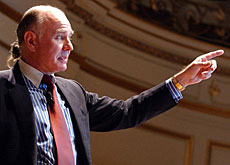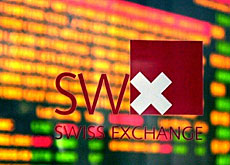“Dr Doom” gives gloomy economic forecast

Falling stock markets have investors wondering whether a crash is imminent. Swiss economics guru Marc Faber tells swissinfo why being bearish now is justified.
The Zurich-born financial analyst, known as “Dr Doom”, predicts serious consequences for the American policy of printing more dollars to service a growing budget deficit.
Faber reckons investors would be well advised to shift their investments to Asia, where assets are growing. This is a trend recognised by investment banks, which have begun moving wealth management operations eastwards.
The Swiss analyst gained global attention for predicting the 1987 Wall Street crash, the bursting of the Japanese bubble in 1990 and the financial crises of late 1990s.
He is editor of the Gloom, Boom and Doom report and author of the bestselling book “Tomorrow’s Gold”.
swissinfo: Will we see another stock market crash in the near future?
Marc Faber: The US can print dollars to finance their interest payments on foreign debt. But a crisis can occur if the dollar then deflates against commodities or a basket of foreign currencies.
By printing money [US Federal Reserve chairmen] Alan Greenspan and Ben Bernanke have created bubbles all over the place that could lead to one volcanic eruption after the other. The end result is that you usually have to implement financial reforms that lead to a big time deflationary bust.
People always ask me what is the catalyst to a disaster, but I don’t know. I know the reasons behind the Asian crises, but why did it happen in June 1997 or not January 1996 or April 1998? I don’t know, the psychology just changed.
swissinfo: Will commodity [which includes oil] prices also decline?
M.F.: If you consider that commodity bull markets [when prices rise] last between 20 and 30 years then we are in year five at the moment. [But] that does not mean that when you are in a bull market you don’t get very significant price corrections.
swissinfo: What do you advise Swiss investors to do?
M.F.: If I look at the portfolio allocation of a typical Swiss family they will still have the bulk of their money in European and US shares.
Families and pension funds here should have more assets in Asia than America because there is a shift of wealth and Asian currencies are strengthening against the US dollar. I would allocate at least 50 per cent of a clients’ money in Asia and move it away from the US.
swissinfo: Investment banks are moving their activities to Asia. Will this have an adverse affect on the European markets?
M.F.: For the first time in modern history the foreign exchange reserves of Brazil, China, Russia and India are larger than those of the G7 [group of industrialised] nations, representing a fifth of the world’s wealth.
Some of this wealth goes to rich individuals so the banks have all moved to Singapore and Hong Kong to open private banking departments. I think that [this trend] is going to grow very rapidly over time.
This is not necessarily at the expense of the old European centres, because some Russian, eastern European and African money comes to Europe. But it is no longer the case that all money comes to the US and Europe.
swissinfo: Do you like your nickname “Dr Doom”?
M.F.: In the financial industry the fund managers are always bullish because it is very difficult for a fund manager to write a letter to their investors advising them to sell all their stocks in their funds.
I’m a believer that the markets will fluctuate and if you write the type of newsletter that I write then you can look at a whole range of assets across the world and be bullish some times and bearish at others. I’m bearish on everything right now.
swissinfo-interview: Matthew Allen in Zurich
Marc Faber was born in Zurich and studied economics at the city’s university.
Since 1973 he has lived in Hong Kong and Thailand, setting up his own business Marc Faber Ltd, which acts as an investment advisor and fund manager.
Stock markets around the world have been falling sharply in recent weeks amid fears of a rise in US interest rates. This follows a sustained period of steady gains.
The last stock market crash occurred in 1997/8, sparked by a crisis in the Asia-Pacific region.
Oil prices leapt to a record prices last month, peaking at more than $70 a barrel for the first time.

In compliance with the JTI standards
More: SWI swissinfo.ch certified by the Journalism Trust Initiative




You can find an overview of ongoing debates with our journalists here. Please join us!
If you want to start a conversation about a topic raised in this article or want to report factual errors, email us at english@swissinfo.ch.